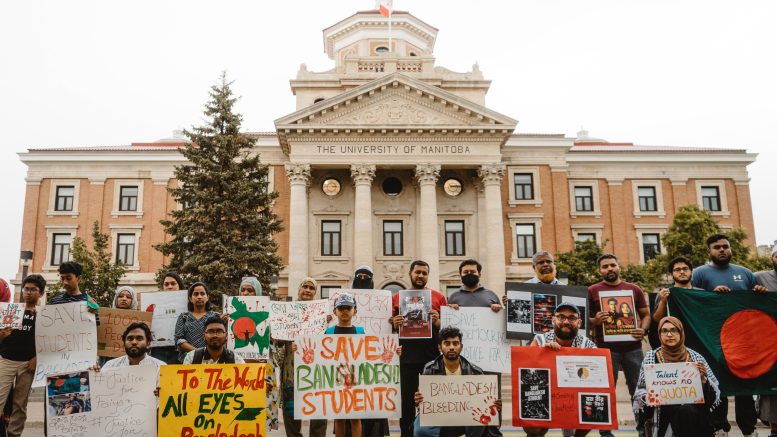The night after the police opened fire on a peaceful protester, Abu Sayed, I slept for only 45 minutes.
The violent events that transpired in Bangladesh from July 15 has tainted the headspace of Bangladeshi students at the U of M.
Bangladeshi students at the U of M experienced shock and grief because of these violent incidents abroad, and I hope to understand how the unrest in Bangladesh affects our psyche.
July 16 marks the day that police shot Abu Sayed, a university student in Rangpur, while he stood peacefully in support of the quota reform protests. Two days later, police clashed with protesters at the BRAC University campus in Dhaka. These incidents show the magnitude of the bloodshed. Bangladeshi society stands transformed. They have impacted the mental state of the U of M student community. The peaceful gatherings and protests in Winnipeg demonstrate the shock that the Bangladeshi students experienced.
Bangladeshi students lived a normal university life and were swept up in lectures, assignments and personal obligations. On July 15, extreme political violence ensued in Bangladesh. More than 600 people died in clashes between police, pro-government groups and protesters from July 16 to Aug. 6, according to the Office of the High Commissioner for Human Rights (OHCHR). The OHCHR further stated that police forces used firearms against peaceful protesters.
During the BRAC University clash, police used batons and tear gas canisters against the students, as reported by the Daily Star. My peers and friends study there. With rising death tolls, violence unraveled like ripping off a blindfold. Initially, I did not realize the scale of the violence. Reading a deadly news story is not unfamiliar to most people. But soon, I realized that the proximity of the unrest was unprecedented. The clashes, resulting in injuries and deaths, felt near and intimate in a way that many young students have not experienced.
I received news of my neighbours, cousins and peers getting injured during protests. Many students lost their loved ones during the violence. It’s like watching an explosion from a window, thinking your house is safe, before realizing that you are also in danger.
Students continue to mourn the deaths and injuries of their friends and peers. These events irrevocably damaged the lives of my peers. They peacefully gathered to express their grievances with the unrest. On July 18, students first gathered at the U of M Fort Garry campus to express their support for the students in Bangladesh. The Winnipeg community subsequently organized multiple protests over the month of July. We sought comfort in each other, trying to make sense of the horrors transpiring back home. The U of M Bangladeshi student community felt extreme distress and anxiety surrounding these incidents. As the violence continued, students at the U of M felt powerless.
“I didn’t sleep and eat for six or seven days,” says Rifah Tasfia Islam Arpa, a Bangladeshi student at the International College of Manitoba. “And that time […], my final exams were coming up, and my studies were really in the down low,” she said. “For six days, I was not even able to know [if] my injured friends and cousins [were] alive or not.”
The bloodshed in Bangladesh has deeply affected the mental health of students at the U of M.
Overall, it’s uncomfortable to compare one’s own life trajectory with that of the university students who died during these protests. Students at the U of M submit assignments, worry about grades and dream about the future. Those included in the death toll once experienced these emotions. Abu Sayed studied English at Begum Rokeya University in Rangpur. I study English at the U of M. We may have shared many literary opinions and likes. These thoughts distress me. They bring to light a collective trauma that Bangladeshi students have undergone. Collective trauma explains the thoughts and memories of a traumatic event, shared by a society or group. Over 600 lives lost, as reported, marks the grief, loss and trauma of the students. Students feel the absence of their late friends.
However, peaceful gatherings at the university campus, offering comfort to friends, demonstrate the strength and unity of our student body. These are tangible steps essential in addressing the collective trauma we face. We feel deep mourning and sadness for what has transpired in Bangladesh.
Over one month has passed since the beginning of the violence, and I still sleep no more than three hours a nigh



